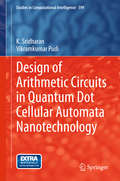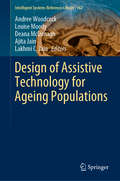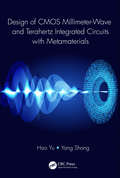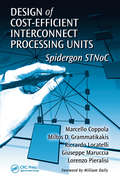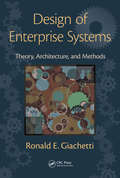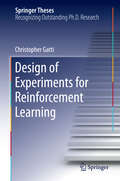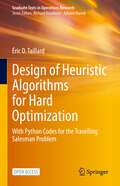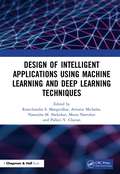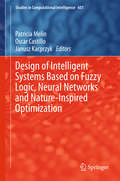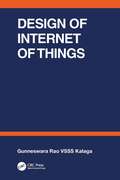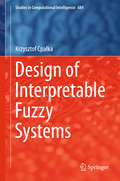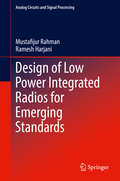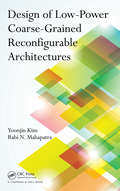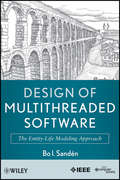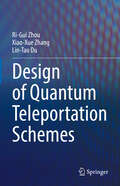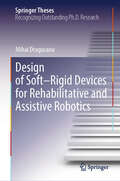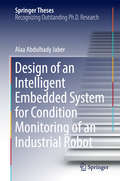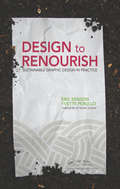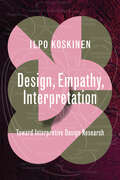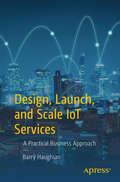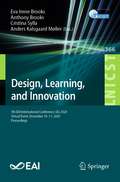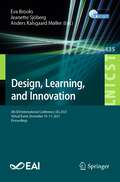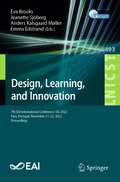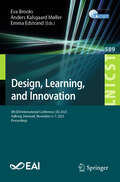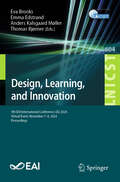- Table View
- List View
Design of Arithmetic Circuits in Quantum Dot Cellular Automata Nanotechnology
by K. Sridharan Vikramkumar PudiThis research monograph focuses on the design of arithmetic circuits in Quantum Dot Cellular Automata (QCA). Using the fact that the 3-input majority gate is a primitive in QCA, the book sets out to discover hitherto unknown properties of majority logic in the context of arithmetic circuit designs. The pursuit for efficient adders in QCA takes two forms. One involves application of the new results in majority logic to existing adders. The second involves development of a custom adder for QCA technology. A QCA adder named as hybrid adder is proposed and it is shown that it outperforms existing multi-bit adders with respect to area and delay. The work is extended to the design of a low-complexity multiplier for signed numbers in QCA. Furthermore the book explores two aspects unique to QCA technology, namely thermal robustness and the role of interconnects. In addition, the book introduces the reader to QCA layout design and simulation using QCADesigner. Features & Benefits: This research-based book: ·Introduces the reader to Quantum Dot Cellular Automata, an emerging nanotechnology. ·Explores properties of majority logic. ·Demonstrates application of the properties to design efficient arithmetic circuits. ·Guides the reader towards layout design and simulation in QCADesigner.
Design of Assistive Technology for Ageing Populations (Intelligent Systems Reference Library #167)
by Lakhmi C. Jain Louise Moody Andree Woodcock Deana McDonagh Ajita JainThis book focuses on various aspects of research on aging, including in relation to assistive technology; dignity of aging; how technology can support a greater understanding of the experience of physically aging and cognitive changes; mobility issues associated with the elderly; and emerging technologies. The 80+ age group represents an expanding market, with an estimated worth of £21.4 billion a year. Everyone is affected by this shift in demographics – we are getting older and may become carers – and we need to prepare ourselves and adjust our surroundings for longer life. Products, services and environments have been changing in response to the changing population. Presenting international design research to demonstrate the thinking and ideas shaping design, this book is a valuable resource for designers; product developers; employers; gerontologists; and medical, health and service providers; as well as everyone interested in aging.
Design of CMOS Millimeter-Wave and Terahertz Integrated Circuits with Metamaterials
by Hao Yu Yang ShangThis book shows that with the use of metamaterials, one can have coherent THz signal generation, amplification, transmission, and detection for phase-arrayed CMOS transistors with significantly improved performance. Offering detailed coverage from device to system, the book describes the design and application of metamaterials in actual CMOS integrated circuits, includes real circuit examples and chip demonstrations with measurement results, and also evaluates system performance after CMOS-based system-on-chip integration. The book reflects the latest research progress and provides a state-of-the-art reference on CMOS-based metamaterial devices and mm-wave and THz systems.
Design of Cost-Efficient Interconnect Processing Units: Spidergon STNoC (System-on-Chip Design and Technologies)
by Marcello Coppola Miltos D. Grammatikakis Riccardo Locatelli Giuseppe Maruccia Lorenzo PieralisiStreamlined Design Solutions Specifically for NoCTo solve critical network-on-chip (NoC) architecture and design problems related to structure, performance and modularity, engineers generally rely on guidance from the abundance of literature about better-understood system-level interconnection networks. However, on-chip networks present several distinct challenges that require novel and specialized solutions not found in the tried-and-true system-level techniques. A Balanced Analysis of NoC ArchitectureAs the first detailed description of the commercial Spidergon STNoC architecture, Design of Cost-Efficient Interconnect Processing Units: Spidergon STNoC examines the highly regarded, cost-cutting technology that is set to replace well-known shared bus architectures, such as STBus, for demanding multiprocessor system-on-chip (SoC) applications. Employing a balanced, well-organized structure, simple teaching methods, numerous illustrations, and easy-to-understand examples, the authors explain: how the SoC and NoC technology works why developers designed it the way they did the system-level design methodology and tools used to configure the Spidergon STNoC architecture differences in cost structure between NoCs and system-level networks From professionals in computer sciences, electrical engineering, and other related fields, to semiconductor vendors and investors – all readers will appreciate the encyclopedic treatment of background NoC information ranging from CMPs to the basics of interconnection networks. The text introduces innovative system-level design methodology and tools for efficient design space exploration and topology selection. It also provides a wealth of key theoretical and practical MPSoC and NoC topics, such as technological deep sub-micron effects, homogeneous and heterogeneous processor architectures, multicore SoC, interconnect processing units, generic NoC components, and embeddings of common communication patterns. An Arsenal of Practical Learning Tools at Your DisposalThe book features a complimentary CD-ROM for practical training on NoC modeling and design-space exploration. It incorporates the award-winning System C-based On-Chip Communication Network (OCCN) environment, the only open-source network modeling and simulation framework currently available. With its consistent, comprehensive overview of the state of the art – and future trends – of NoC design, this indispensible text can help readers harness the value within the vast and ever-changing world of network-on-chip technology.
Design of Enterprise Systems: Theory, Architecture, and Methods
by Ronald GiachettiIn practice, many different people with backgrounds in many different disciplines contribute to the design of an enterprise. Anyone who makes decisions to change the current enterprise to achieve some preferred structure is considered a designer. What is problematic is how to use the knowledge of separate aspects of the enterprise to achieve a globally optimized enterprise. The synthesis of knowledge from many disciplines to design an enterprise defines the field of enterprise engineering.Because enterprise systems are exceedingly complex, encompassing many independent domains of study, students must first be taught how to think about enterprise systems. Specifically written for advanced and intermediate courses and modules, Design of Enterprise Systems: Theory, Architecture, and Methods takes a system-theoretical perspective of the enterprise. It describes a systematic approach, called the enterprise design method, to design the enterprise. The design method demonstrates the principles, models, methods, and tools needed to design enterprise systems. The author uses the enterprise system design methodology to organize the chapters to mimic the completion of an actual project. Thus, the book details the enterprise engineering process from initial conceptualization of an enterprise to its final design.Pedagogical tools available include:For instructors: PowerPoint® slides for each chapter Project case studies that can be assigned as long-term projects to accompany the text Quiz questions for each chapter Business Process Analyzer software available for download For students: Templates, checklists, forms, and models to support enterprise engineering activities The book fills a need for greater design content in engineering curricula by describing how to design enterprise systems. Inclusion of design is also critical for business students, since they must realize the import their decisions may have on the long-term design of the enterprises they work with. The book’s practical focus and project-based approach coupled with the pedagogical tools gives students the knowledge and skills they need to lead enterprise engineering projects.
Design of Experiments for Reinforcement Learning
by Christopher GattiThis thesis takes an empirical approach to understanding of the behavior and interactions between the two main components of reinforcement learning: the learning algorithm and the functional representation of learned knowledge. The author approaches these entities using design of experiments not commonly employed to study machine learning methods. The results outlined in this work provide insight as to what enables and what has an effect on successful reinforcement learning implementations so that this learning method can be applied to more challenging problems.
Design of Heuristic Algorithms for Hard Optimization: With Python Codes for the Travelling Salesman Problem (Graduate Texts in Operations Research)
by Éric D. TaillardThis open access book demonstrates all the steps required to design heuristic algorithms for difficult optimization. The classic problem of the travelling salesman is used as a common thread to illustrate all the techniques discussed. This problem is ideal for introducing readers to the subject because it is very intuitive and its solutions can be graphically represented. The book features a wealth of illustrations that allow the concepts to be understood at a glance. The book approaches the main metaheuristics from a new angle, deconstructing them into a few key concepts presented in separate chapters: construction, improvement, decomposition, randomization and learning methods. Each metaheuristic can then be presented in simplified form as a combination of these concepts. This approach avoids giving the impression that metaheuristics is a non-formal discipline, a kind of cloud sculpture. Moreover, it provides concrete applications of the travelling salesman problem, which illustrate in just a few lines of code how to design a new heuristic and remove all ambiguities left by a general framework. Two chapters reviewing the basics of combinatorial optimization and complexity theory make the book self-contained. As such, even readers with a very limited background in the field will be able to follow all the content.
Design of Intelligent Applications using Machine Learning and Deep Learning Techniques
by Antonis Michalas Meera Narvekar Ramchandra S. Mangrulkar Narendra M. Shekokar Pallavi V. ChavanMachine learning (ML) and deep learning (DL) algorithms are invaluable resources for Industry 4.0 and allied areas and are considered as the future of computing. A subfield called neural networks, to recognize and understand patterns in data, helps a machine carry out tasks in a manner similar to humans. The intelligent models developed using ML and DL are effectively designed and are fully investigated – bringing in practical applications in many fields such as health care, agriculture and security. These algorithms can only be successfully applied in the context of data computing and analysis. Today, ML and DL have created conditions for potential developments in detection and prediction. Apart from these domains, ML and DL are found useful in analysing the social behaviour of humans. With the advancements in the amount and type of data available for use, it became necessary to build a means to process the data and that is where deep neural networks prove their importance. These networks are capable of handling a large amount of data in such fields as finance and images. This book also exploits key applications in Industry 4.0 including: · Fundamental models, issues and challenges in ML and DL. · Comprehensive analyses and probabilistic approaches for ML and DL. · Various applications in healthcare predictions such as mental health, cancer, thyroid disease, lifestyle disease and cardiac arrhythmia. · Industry 4.0 applications such as facial recognition, feather classification, water stress prediction, deforestation control, tourism and social networking. · Security aspects of Industry 4.0 applications suggest remedial actions against possible attacks and prediction of associated risks. - Information is presented in an accessible way for students, researchers and scientists, business innovators and entrepreneurs, sustainable assessment and management professionals. This book equips readers with a knowledge of data analytics, ML and DL techniques for applications defined under the umbrella of Industry 4.0. This book offers comprehensive coverage, promising ideas and outstanding research contributions, supporting further development of ML and DL approaches by applying intelligence in various applications.
Design of Intelligent Systems Based on Fuzzy Logic, Neural Networks and Nature-Inspired Optimization
by Oscar Castillo Patricia Melin Janusz KacprzykThis book presents recent advances on the design of intelligent systems based on fuzzy logic, neural networks and nature-inspired optimization and their application in areas such as, intelligent control and robotics, pattern recognition, time series prediction and optimization of complex problems. The book is organized in eight main parts, which contain a group of papers around a similar subject. The first part consists of papers with the main theme of theoretical aspects of fuzzy logic, which basically consists of papers that propose new concepts and algorithms based on fuzzy systems. The second part contains papers with the main theme of neural networks theory, which are basically papers dealing with new concepts and algorithms in neural networks. The third part contains papers describing applications of neural networks in diverse areas, such as time series prediction and pattern recognition. The fourth part contains papers describing new nature-inspired optimization algorithms. The fifth part presents diverse applications of nature-inspired optimization algorithms. The sixth part contains papers describing new optimization algorithms. The seventh part contains papers describing applications of fuzzy logic in diverse areas, such as time series prediction and pattern recognition. Finally, the eighth part contains papers that present enhancements to meta-heuristics based on fuzzy logic techniques.
Design of Internet of Things
by Gunneswara VSSS Kalaga RaoThe text provides a comprehensive overview of the design aspects of the internet of things devices and covers the fundamentals of big data and data science. It explores various scenarios such as what are the middleware and frameworks available and how to build a stable, standards-based, and Secure internet of things device. It discusses important concepts including embedded programming techniques, machine-to-machine architecture, and the internet of things for smart city applications. It will serve as an ideal design book for professionals, senior undergraduate, and graduate students in the fields including electrical engineering, electronics and communication engineering, and computer engineering. The book- Covers applications and architecture needed to deliver solutions to end customers and readers. Discusses practical aspects of implementing the internet of things in diverse areas including manufacturing, and software development. Highlights big data concepts and embedded programming techniques. Presents technologies including machine to machine, integrated sensors, and radio-frequency identification. Introduces global system for mobile communication and precise details of standards based on internet of things architecture models. The book focuses on practical design aspects such as how to finalize a processor integrated circuit, which operating system to use, etc. in a single volume. It will serve as an ideal text for professionals, senior undergraduate, and graduate students in diverse engineering domains including electrical, electronics and communication, computer.
Design of Interpretable Fuzzy Systems (Studies in Computational Intelligence #684)
by Krzysztof CpałkaThis book shows that the term “interpretability” goes far beyond the concept of readability of a fuzzy set and fuzzy rules. It focuses on novel and precise operators of aggregation, inference, and defuzzification leading to flexible Mamdani-type and logical-type systems that can achieve the required accuracy using a less complex rule base. The individual chapters describe various aspects of interpretability, including appropriate selection of the structure of a fuzzy system, focusing on improving the interpretability of fuzzy systems designed using both gradient-learning and evolutionary algorithms. It also demonstrates how to eliminate various system components, such as inputs, rules and fuzzy sets, whose reduction does not adversely affect system accuracy. It illustrates the performance of the developed algorithms and methods with commonly used benchmarks. The book provides valuable tools for possible applications in many fields including expert systems, automatic control and robotics.
Design of Low Power Integrated Radios for Emerging Standards (Analog Circuits and Signal Processing)
by Ramesh Harjani Mustafijur RahmanThis book describes novel and disruptive architecture and circuit design techniques, toward the realization of low-power, standard-compliant radio architectures and silicon implementation of the circuits required for a variety of leading-edge applications. Readers will gain an understanding of the circuit level challenges that exist for low power radios, compatible with the IEEE 802.15.6 standard. The authors discuss current techniques to address some of these challenges, helping readers to understand the state-of-the-art, and to address the various, open research problems that exist with respect to realizing low power radios.Enables readers to face challenging bottleneck in low power radio design, with state-of-the-art, circuit-level design techniques;Provides readers with basic knowledge of circuits suitable for low power radio circuits compatible with the IEEE 802.15.6 standard;Discusses new and emerging architectures and circuit techniques, enabling applications such as body area networks and internet of things.
Design of Low-Power Coarse-Grained Reconfigurable Architectures
by Yoonjin Kim Rabi N. MahapatraCoarse-grained reconfigurable architecture (CGRA) has emerged as a solution for flexible, application-specific optimization of embedded systems. Helping you understand the issues involved in designing and constructing embedded systems, Design of Low-Power Coarse-Grained Reconfigurable Architectures offers new frameworks for optimizing the architect
Design of Multithreaded Software: The Entity-Life Modeling Approach
by Bo I. SandenThis book assumes familiarity with threads (in a language such as Ada, C#, or Java) and introduces the entity-life modeling (ELM) design approach for certain kinds of multithreaded software. ELM focuses on "reactive systems," which continuously interact with the problem environment. These "reactive systems" include embedded systems, as well as such interactive systems as cruise controllers and automated teller machines. Part I covers two fundamentals: program-language thread support and state diagramming. These are necessary for understanding ELM and are provided primarily for reference. Part II covers ELM from different angles. Part III positions ELM relative to other design approaches.
Design of Quantum Teleportation Schemes
by Ri-Gui Zhou Xiao-Xue Zhang Lin-Tao DuThis book offers a design-centered approach to quantum teleportation as well as in-depth analysis of various quantum teleportation schemes. Quantum teleportation, a vital component of practical quantum communication technologies, serves as a secure and reliable way to transmit confidential information. Quantum teleportation relies on the unique physical property of quantum superposition, accomplishing the remote transmission of information through unitary transformations and measurements on entangled states, combined with classical communication. Therefore, as one of the safe and reliable means of quantum state transmission between communicating parties, quantum teleportation is bound to play a vital role in future quantum communication. This book begins with the basics of quantum teleportation before going on to consider various refinements such as controlled, bidirectional, cyclic, symmetric, and asymmetric scenarios. It goes further, investigating a multitude of quantum teleportation schemes in bidirectional, controlled bidirectional, cyclic bidirectional, asymmetric cyclic controlled, and noisy environments, and conducts detailed performance analyses of these schemes. This book is an essential resource for students, researchers, and professionals in the field of quantum communications.
Design of Soft–Rigid Devices for Rehabilitative and Assistive Robotics (Springer Theses)
by Mihai DragusanuThis book describes a comprehensive research project in which different devices for rehabilitation, assistance, and haptic applications are designed and developed. The fil-rouge is the user-centered perspective, that has been employed in all the design and development phases, and the exploitation of soft robotics solutions allowing for a safe and comfortable interaction with the user. Extensive information concerning the design, the practical application and the assessment of various assistive devices for upper limb are included throughout the book, which also offers an up-to-date reference guide for dealing with future interdisciplinary research projects involving soft robotics and user-centered perspectives for enhancing robotic assistance capabilities
Design of an Intelligent Embedded System for Condition Monitoring of an Industrial Robot
by Alaa Abdulhady JaberThis thesis introduces a successfully designed and commissioned intelligent health monitoring system, specifically for use on any industrial robot, which is able to predict the onset of faults in the joints of the geared transmissions. However the developed embedded wireless condition monitoring system leads itself very well for applications on any power transmission equipment in which the loads and speeds are not constant, and access is restricted. As such this provides significant scope for future development. Three significant achievements are presented in this thesis. First, the development of a condition monitoring algorithm based on vibration analysis of an industrial robot for fault detection and diagnosis. The combined use of a statistical control chart with time-domain signal analysis for detecting a fault via an arm-mounted wireless processor system represents the first stage of fault detection. Second, the design and development of a sophisticated embedded microprocessor base station for online implementation of the intelligent condition monitoring algorithm, and third, the implementation of a discrete wavelet transform, using an artificial neural network, with statistical feature extraction for robot fault diagnosis in which the vibration signals are first decomposed into eight levels of wavelet coefficients.
Design to Renourish: Sustainable Graphic Design in Practice
by Eric Benson Yvette PerulloInspiration is everywhere when you stop to not just smell but watch the roses. Mother Nature’s interwoven relationships between all life can serve as a powerful model for graphic designers to create sustainable print and digital work. Design to Renourish is a book for the graphic design professional that helps to integrate sustainability into their workflow through a design process called systems thinking. This process asks the graphic designer to approach a design problem by being more informed and aware of and influenced by the impacts that material and vendor choices have on one another, the planet, and consequently on us. <P><P>The book not only walks the reader through how to design with Mother Nature as a model, but also offers solutions to the real life challenges of working with the client to create sustainable work. Through ten case studies that feature interviews with international design teams who embrace a sustainable systems methodology, the reader will gain valuable insights on how to design to renourish and improve life on Earth.
Design, Empathy, Interpretation: Toward Interpretive Design Research (Design Thinking, Design Theory)
by Ilpo KoskinenA new, empathic approach to design research, drawn from the informed experiences of a leading design research program in Finland.Design, Empathy, Interpretation tells the story of empathic design, a design research program at Aalto University in Helsinki, Finland, that has developed an interpretive approach to design over the past twenty years. As one of the leaders of the Helsinki group, Ilpo Koskinen draws on his own experiences to offer readers a general intellectual and professional history of design research, and argues for what he calls an interpretive approach. Design, Empathy, Interpretation shows how the group has created connections all across the globe, and how a seemingly soft approach to design research can be useful in both industry and government.Koskinen follows design research&’s transformation from questions of usability, in the 1980s, through to the revolution in personal electronics and the &“user-centered&” turn of the 1990s. Using the research community in Helsinki as a case study, and moving between specific projects and theoretical debates, he offers readers a focused introduction to the major methodological and intellectual challenges—as well as the opportunities—of design research. He argues that all design tasks, however simple or complex, begin with understanding the way humans ascribe meaning, both as individuals and as actors in complex societies. Thus all design research must be interpretive at its core.A new, empathic approach to design research, drawn from the informed experiences of a leading design research program in Finland.
Design, Launch, and Scale IoT Services: A Practical Business Approach
by Barry HaughianThe Internet of Things is causing major industry disruption, so companies need to plan and manage their “IoT journey” to maximize all business opportunities. In this book companies can learn how to successfully create, launch and manage Internet of Things services. It takes the reader through the process of specifying, implementing, and deploying IoT services; detailing how to scale and manage an IoT business. It introduces the fundamentals of IoT services, explaining IoT service building blocks and the key factors to be considered in the design of IoT services. Moving into the IoT field requires speed. This book provides a fast track approach to IoT; summarizing the global experiences of the author, detailing the discussions, mistakes, successes, learnings and conclusions. Building an Internet of Things Service enables readers to accelerate their own on-boarding in their IoT journey.What You'll LearnCreate new IoT ServicesReview the basic IoT concepts and business implications you need to know as you embark on your IoT journeySolve the major challenges presented by the IoT disruption.Accelerate your own on-boarding in their IoT journey.Who This Book Is ForThe primary audience is made up of business executives and IoT startups. The secondary audience is students studying IoT in universities and those interested in understanding the fundamentals of an IoT business. No technical background is required.
Design, Learning, and Innovation: 5th EAI International Conference, DLI 2020, Virtual Event, December 10-11, 2020, Proceedings (Lecture Notes of the Institute for Computer Sciences, Social Informatics and Telecommunications Engineering #366)
by Cristina Sylla Anthony Brooks Eva Irene Brooks Anders Kalsgaard MøllerThis book constitutes the refereed post-conference proceedings the 5th EAI International Conference on DLI 2020, Design, Leaning and Innovation, which took place in December 2020. Due to COVID-19 pandemic the conference was held virtually. The 14 revised full papers presented were carefully selected from 40 submissions and are organized in four thematic sessions on: digital technologies and learning; designing for innovation; digital games, gamification and robots; designs for innovative learning.
Design, Learning, and Innovation: 6th EAI International Conference, DLI 2021, Virtual Event, December 10-11, 2021, Proceedings (Lecture Notes of the Institute for Computer Sciences, Social Informatics and Telecommunications Engineering #435)
by Eva Brooks Anders Kalsgaard Møller Jeanette SjöbergThis book constitutes the refereed post-conference proceedings the 6th EAI International Conference on Design, Leaning and Innovation, DLI 2021, which took place in December 2021. Due to COVID-19 pandemic the conference was held virtually. The theme for DLI 2021 was “Shifting boundaries to discover novel ways and emerging technologies to realise human needs, ideas, and desires” targeting a conceptualisation of the effects and impact of digital technologies for, in an inclusive and playful way, fostering human beings to realising their needs, ideas and desires. The 17 revised full papers presented were carefully selected from 36 submissions and are organized in four thematic sessions on: digital technologies, design and learning; tools and models; artificial intelligence, virtual reality and augmented reality in learning; innovative designs and learning.
Design, Learning, and Innovation: 7th EAI International Conference, DLI 2022, Faro, Portugal, November 21-22, 2022, Proceedings (Lecture Notes of the Institute for Computer Sciences, Social Informatics and Telecommunications Engineering #493)
by Eva Brooks Anders Kalsgaard Møller Jeanette Sjöberg Emma EdstrandThis book constitutes the refereed post-conference proceedings the 7th International Conference on Design, Leaning and Innovation, DLI 2022, which took place in Faro, Portugal, in November 21-22, 2022. The 4 revised full papers and 2 short papers presented were carefully selected from 32 submissions on. They were organized in topical sections as follows: Digital Environments and Design Processes Fostering Learning and Interaction, Designs for Innovative Learning with Digital Technology, Digital Approaches Shaping Educational Practices.
Design, Learning, and Innovation: 8th EAI International Conference, DLI 2023, Aalborg, Denmark, November 6–7, 2023, Proceedings (Lecture Notes of the Institute for Computer Sciences, Social Informatics and Telecommunications Engineering #589)
by Eva Brooks Anders Kalsgaard Møller Emma EdstrandThis book constitutes the refereed post-conference proceedings of the 8th EAI International Conference on Design, Learning, and Innovation, DLI 2023, held in Aalborg, Denmark, during November 6–7, 2023. The 16 full papers included in this book were carefully reviewed and selected from 48 submissions. They were organized in topical sections as follows: innovative approaches to enhancing education and student well-being; innovations in virtual reality (VR) and automated technologies for enhanced user experiences; exploring innovative approaches to learning and design; and innovative learning environments: collaborative approaches and emerging technologies.
Design, Learning, and Innovation: 9th EAI International Conference, DLI 2024, Virtual Event, November 7–8, 2024, Proceedings (Lecture Notes of the Institute for Computer Sciences, Social Informatics and Telecommunications Engineering #604)
by Eva Brooks Anders Kalsgaard Møller Emma Edstrand Thomas BjørnerThis book constitutes the refereed proceedings of the 9th EAI International Conference on Design, Learning, and Innovation, DLI 2024, held virtually, during November 7–8, 2024. The 11 full papers included in this book were carefully reviewed and selected from 29 submissions. They were organized in topical sections as follows: Using Immersive Technologies for Learning, Accessibility, and Technological Innovation; and Engaging Learners through Gamification, Playful Design, and Generative AI.
